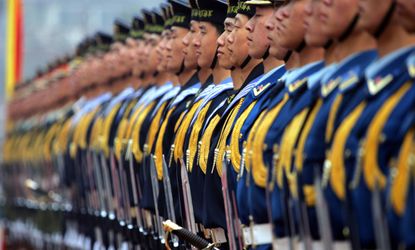China has not replaced America — and it never will
For starters, China doesn't want to be a global hegemon

Many people seem to think it's simply a matter of when, not if, China takes the reins of world leadership. How, they think, can America's 314 million people permanently outproduce a population that outnumbers the U.S. by over a billion people?
This facile assumption is wrong. China is not replacing the United States as the global hegemon. And it never will.
China faces too many internal problems and regional rivals to ever make a real play for global leadership. And even if Beijing could take the global leadership mantle soon, it wouldn't. China wants to play inside the existing global order's rules, not change them.
Subscribe to The Week
Escape your echo chamber. Get the facts behind the news, plus analysis from multiple perspectives.

Sign up for The Week's Free Newsletters
From our morning news briefing to a weekly Good News Newsletter, get the best of The Week delivered directly to your inbox.
From our morning news briefing to a weekly Good News Newsletter, get the best of The Week delivered directly to your inbox.
Start with the obvious military point: The Chinese military has nothing like the global reach of its American rival's. China only has one aircraft carrier, a refitted Russian vessel. The U.S. has 10, plus nine marine mini-carriers. China's first homemade carrier is slated for completion in 2018, by which time the U.S. will have yet another modern carrier, and be well on its way to finishing another. The idea that China will be able to compete on a global scale in the short to medium term is absurd.
Even in East Asia, it's not so easy for China. In 2012, Center for Strategic and International Studies experts Anthony Cordesman and Nicholas Yarosh looked at the data on Chinese and Taiwanese military strength. They found that while China's relative naval strength was growing, Taiwan had actually improved the balance of air power in its favor between 2005 and 2012 — just as China's economic growth rate, and hence influx of new resources to spend on its military, was peaking.
China's equipment is often outdated, and its training regimes can be comically bad. A major part of its strategic missile force patrols on horseback because it doesn't have helicopters.
This isn't to deny China's military is getting stronger. It is. And one day, this might require the United States to rethink its strategic posture in East Asia. But Chinese hard power is nowhere close to replacing, or even thinking about challenging, American military hegemony.
Sign up for Today's Best Articles in your inbox
A free daily email with the biggest news stories of the day – and the best features from TheWeek.com
And look at China's geopolitical neighborhood. As a result of historical enmity and massive power disparities, Beijing would have a tough time convincing Japan, South Korea, and Taiwan that its military buildup is anything but threatening. Consequently, the smaller East Asian states are likely to get over their mutual disagreements and stick it out together in the American-led alliance system for the foreseeable future.
To the north and west, China is bordered by Russia and India. China fought each of them as recently as the 1960s, and both are likely to be threatened by any serious Chinese military buildup. Unlike the United States, bordered by oceans and two friendly states, China is surrounded by enemies and rivals. Projecting power globally is hard when you've got to worry about defending your own turf.
But what happens when China's GDP passes America's? Well, for one thing, we're not really sure when that will be. Realizing that current growth rates were economically and ecologically unsustainable, the Chinese government cut off the investment spigot that fueled its extraordinary 10 percent average annual growth. Today, China's growth rate is about half of what it was in 2007. One analysis suggests China's GDP may not surpass America's until the 2100s.
Moreover, China's GDP per capita is a long way off from matching Western standards. In 2012, the World Bank assessed China's at $6,009; the United States' was $57,749. The per-person measure of wealth matters in that it reflects the government's capacity to pay for things that make its citizens happy and healthy.
That's where China's internal headaches begin. The Chinese government has staked its domestic political legitimacy on delivering rapid, massive improvements in quality of life for its citizens. As growth slows, domestic political dissent may rise. Moreover, growth's worst side effect to date — an unprecedented ecological crisis — is also a source of massive discontent. China has 20 of the world's 30 most polluted cities; environmental cleanup costs may hoover up 3 percent of China's GDP. That's throwing 30 percent of its yearly average growth (during the pre-2013 boom years!) down the drain.
The mass death and poisoning that follow as severe pollution's handmaidens threaten the very foundations of the Communist Party's power. American University China scholar Judith Shapiro writes that environmental protests — which sometimes "shut down" huge cities — are "so severe and so central to the manner in which China will 'rise' that it is no exaggeration to say that they cannot be separated from its national identity and the government's ability to provide for the Chinese people."
That's hardly the only threat to the Chinese economy. China's financial system bears a disturbing resemblance to pre-crisis Wall Street. Its much-vaunted attempt to move away from an unsustainable export-based economy, according to Minxin Pei, may break on the rocks of massive corruption and other economic problems. After listing a slew of related problems, Pei suggests we need to start envisioning a world of "declining Chinese strength and rising probability of an unexpected democratic transition in the coming two decades."
But even if this economic gloom and doom is wrong, and China really is destined for a prosperous future, there's one simple reason China will never displace America as global leader: It doesn't want to.
Chinese foreign policy, to date, has been characterized by a sort of realist incrementalism. China has displayed no interest in taking over America's role as protector of the global commons; that's altogether too altruistic a task. Instead, China is content to let the United States and its allies keep the sea lanes open and free ride off of their efforts. A powerful China, in other words, would most likely to be happy to pursue its own interests inside the existing global order rather than supplanting it.
In 2003, Harvard's Iain Alastair Johnston analyzed data about Chinese hostility to the global status quo across five dimensions: participation in international institutions, compliance with international norms, twisting the rules that govern global institutions, making the transformation of global political power into a clear policy goal, and acting militarily on that objective. He found that China was "more integrated into and more cooperative within international institutions than ever before," and that there was "murky" evidence at best of intent to challenge the United States outside of them. Johnston reassessed parts of his argument in 2013 and concluded that not much had changed.
It actually, then, wouldn't be bad for Americans if China bears like Pei were wrong, and China really did blossom economically in the 21st century. China probably won't have the military means to challenge the foundations of global stability and prosperity, and even if it didn't, its leaders don't seem to want to.
And morally speaking, a Chinese boom would be great: Expanded Chinese economic growth has been the single greatest anti-poverty campaign in modern history. That's an extraordinary accomplishment Americans should be able to celebrate without any attendant status anxiety produced by the phantom of a Chinese world order.
Create an account with the same email registered to your subscription to unlock access.
Zack Beauchamp is a Reporter/Blogger for ThinkProgress. He previously contributed to Andrew Sullivan's The Dish at Newsweek/Daily Beast, and has also written for Foreign Policy and Tablet magazines. Zack holds B.A.s in Philosophy and Political Science from Brown University and an M.Sc in International Relations from the London School of Economics.
-
 The toilet roll tax: UK's strange VAT rules
The toilet roll tax: UK's strange VAT rulesThe Explainer 'Mysterious' and 'absurd' tax brought in £168 billion to HMRC last year
By The Week UK Published
-
Why is Tesla stumbling?
In the Spotlight More competition, confusion about the future and a giant pay package for Elon Musk
By Joel Mathis, The Week US Published
-
 How Taylor Swift changed copyright negotiations in music
How Taylor Swift changed copyright negotiations in musicunder the radar The success of Taylor's Version rerecordings has put new pressure on record labels
By Theara Coleman, The Week US Published
-
 Arizona court reinstates 1864 abortion ban
Arizona court reinstates 1864 abortion banSpeed Read The law makes all abortions illegal in the state except to save the mother's life
By Rafi Schwartz, The Week US Published
-
 Trump, billions richer, is selling Bibles
Trump, billions richer, is selling BiblesSpeed Read The former president is hawking a $60 "God Bless the USA Bible"
By Peter Weber, The Week US Published
-
 The debate about Biden's age and mental fitness
The debate about Biden's age and mental fitnessIn Depth Some critics argue Biden is too old to run again. Does the argument have merit?
By Grayson Quay Published
-
 How would a second Trump presidency affect Britain?
How would a second Trump presidency affect Britain?Today's Big Question Re-election of Republican frontrunner could threaten UK security, warns former head of secret service
By Harriet Marsden, The Week UK Published
-
 'Rwanda plan is less a deterrent and more a bluff'
'Rwanda plan is less a deterrent and more a bluff'Instant Opinion Opinion, comment and editorials of the day
By The Week UK Published
-
 Henry Kissinger dies aged 100: a complicated legacy?
Henry Kissinger dies aged 100: a complicated legacy?Talking Point Top US diplomat and Nobel Peace Prize winner remembered as both foreign policy genius and war criminal
By Harriet Marsden, The Week UK Last updated
-
 Trump’s rhetoric: a shift to 'straight-up Nazi talk'
Trump’s rhetoric: a shift to 'straight-up Nazi talk'Why everyone's talking about Would-be president's sinister language is backed by an incendiary policy agenda, say commentators
By The Week UK Published
-
 More covfefe: is the world ready for a second Donald Trump presidency?
More covfefe: is the world ready for a second Donald Trump presidency?Today's Big Question Republican's re-election would be a 'nightmare' scenario for Europe, Ukraine and the West
By Sorcha Bradley, The Week UK Published